- Register
- Log in to Tune-In
- Wishlist (0)
-
Shopping cart
(0)
You have no items in your shopping cart.
Beatles News

Many of The Beatles’ fans were shocked and devastated when the band announced they were splitting up. However, behind the scenes, it was inevitable as tensions between the band members rose. While it’s hard to pinpoint the exact reason why The Beatles called it quits, there are a few songs that hint at their dissolution.
“The Ballad of John and Yoko” was a single released in 1969 that chronicled the events of John Lennon and Yoko Ono’s wedding, along with their honeymoon activities that included the infamous “bed-in” peace protests. The track featured only Lennon and Paul McCartney. George Harrison and Ringo Starr didn’t skip the track out of spite but because it felt like a track specifically for Lennon.
While this song didn’t create turmoil within The Beatles, it was a sign that Lennon was becoming more interested in creating music with Yoko rather than his fellow bandmates. In Anthology, producer George Martin said “The Ballad of John and Yoko” was evidence that John Lennon had already “mentally left the group.”
Source: Ross Tanenbaum/cheatsheet.com

John Lennon and May Pang's relationship is the subject of an upcoming documentary.
Premiering on April 13, the documentary "The Last Weekend" will focus on The Beatles member's 18-month romance with his and Yoko Ono's secretary. The film will hit theaters amid Pang's busy photo exhibitions in New York and Philadelphia.
In the documentary's preview, the now-72-year-old artist recounted her time with the late singer, including her refusal of Ono's offer to become Lennon's girlfriend.
In 1973, Pang started working as Lennon and Ono's personal secretary. But she had a more intimate relationship with the "Hey Jude" crooner, although she disapproved of it at first.
Speaking about the scenes in "The Last Weekend" preview, Pang told People how Ono asked her to fill the time she would be away from Lennon because she "wanted time apart." With that, she aimed for Pang to become Lennon's new girlfriend until she comes back.
According to Pang, she respected their marriage so much that she refused to do it. She added that she was already happy being their secretary.
Source: Angeline Sicily/musictimes.com
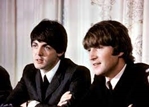
In 1970, nearly a year after John Lennon left the band, Paul McCartney announced that The Beatles were no longer collaborating. Not long after, McCartney filed a lawsuit against the band. He wanted to take control of the catalog from their manager, Allen Klein. The rest of his bandmates vehemently opposed him in this, but they eventually realized that he was right. Lennon admitted this on this day in 1973.
The Beatles began working with Klein after the death of their longtime manager, Brian Epstein. McCartney had never wanted Klein as their manager, instead pushing for Lee Eastman, his father-in-law. He didn’t trust Klein, so in 1970, he sued the band to regain control.
“The only way for me to save The Beatles and Apple — and to release Get Back by Peter Jackson which allowed us to release Anthology and all these great remasters of all the great Beatles records — was to sue the band,” McCartney told GQ. “If I hadn’t done that, it would have all belonged to Allen Klein. The only way I was given to get us out of that was to do what I did.”
Source: Emma McKee/cheatsheet.com
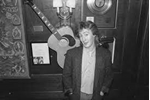
When John Lennon‘s first wife, Cynthia, heard their son, Julian Lennon, sing for the first time following John’s 1980 murder, she had to do a double take. She wasn’t alone. Fans worldwide were stunned when they heard the Beatle’s son sing. Cynthia Lennon was John’s first wife from 1962 to 1968. She knew John before The Beatles were swept up in fame and experienced the most hectic moments of the band’s popularity. So, she got to see many of the behind-the-scenes moments of one of the most important bands in history. Her marriage crumbled in the late 1960s after John started his affair with Yoko Ono. However, she never stopped loving the musician. While he started a new life and solo career in the 1970s, she continued as a designer and raised their son Julian, who eventually pursued a music career like his father.
Source: Hannah Wigandt/cheatsheet.com
details
Choosing George Harrison‘s best collaborations isn’t easy because there are so many. However, for this list, we kept it to the collaborations that happened in the recording studio only, whether they were on one of George’s tracks or another artist’s. Here are 10 of George’s best collaborations. George used Chinese philosophy to write The Beatles’ “While My Guitar Gently Weeps.” In his 1980 memoir, I Me Mine, he explained that he read that everything is relative to everything else in I Ching, the Chinese classic Book of Changes. So, he used it to write a song. He randomly opened a book and saw the words “gently weeps,” and the tune was born. It’s one of George’s best collaborations because he asked Eric Clapton to perform on it. The guitarist was hesitant about playing on a Beatles song, but George’s ego was fine with it. Later, George loved how Clapton performed the song on their 1991 Japanese tour.
Source: Hannah Wigandt/cheatsheet.com
details
Paul McCartney has been one of the most influential figures in the music industry for over six decades. His tenure with The Beatles and his solo career have produced some of the most iconic and timeless music in history, and his legacy continues to inspire new generations of musicians and fans alike. In this article, we will detail the songs that Paul McCartney named his favorites of all time.
McCartney‘s tenure with The Beatles is considered one of the most remarkable musical collaborations in the history of music. Along with John Lennon, George Harrison, and Ringo Starr, McCartney helped revolutionize the music industry and changed the course of music forever. The Beatles‘ innovative and experimental approach to music, coupled with McCartney‘s undeniable talent for songwriting and musical arrangements, led to the creation of timeless classics such as Hey Jude, Let it Be, Yesterday, and Eleanor Rigby.
After the break-up of The Beatles in 1970, McCartney continued his musical journey as a solo artist. He has since released over 25 studio albums, including McCartney, Ram, Band on the Run, Tug of War, and Egypt Station. His solo career has been just as impressive as his work with The Beatles, wit details

Ringo Starr joined The Beatles significantly later than his bandmates, so he didn’t live through some of their earliest experiences as a group. He also wasn’t on all the songs they recorded, though this continued to happen after he joined the band. For various reasons, Starr was not the drummer on five Beatles songs.
Soon after joining the band, Starr joined them in the studio to record “Love Me Do.” He struggled with timekeeping, though, much to the frustration of producer George Martin. Ultimately, Starr’s version of “Love Me Do” made it on the album, but he wasn’t so lucky with another song.
“They started ‘PS I Love You.’ The other bloke played the drums and I was given the maracas,” Starr said in the book The Beatles: The Authorized Biography by Hunter Davies. “I thought, that’s the end. They’re doing a Pete Best [the drummer Starr replaced] on me.”
Starr explained that while his name is on the song, he played maracas while a session musician played drums.
“When the record came out as a single, my name was on ‘PS I Love You,’ but I was only playing the maracas, the other bloke was details

Ringo Starr and John Lennon always had a close friendship. They were the two oldest Beatles members, lived as neighbors, and hung out together after the Fab Four fractured. The drummer was the last Beatle to see John before he died, and Ringo was blown away by his mindset at the time. Years earlier, John’s singing freaked out Ringo, and we understand where the drummer is coming from.
The Beatles split up in 1970, but that didn’t prevent the former bandmates from working together. Ringo played drums on George Harrison’s All Things Must Pass in 1970. He sat at the kit for John’s John Lennon/Plastic Ono Band solo debut the same year. Though used to recording with the bespectacled Beatle, some of John’s behavior in the studio freaked out Ringo, he writes in Postcards From the Boys:
“I can say this now (if he was here, John could tell you), but suddenly we’d be in the middle of a track, and John would just start crying or screaming — which freaked us out at the beginning. But we were always open to whatever anyone was going through, so we just got on with it.”
Source: Jason Rossi/cheatsheet.com
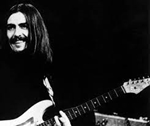
George Harrison’s “Any Road” draws from Lewis Carroll’s Alice in Wonderland. Jefferson Airplane did the same for “White Rabbit.”
Tom Petty and the Heartbreakers did the same for “Don’t Come Around Here No More.”
George Harrison‘s “Any Road” is based on a paraphrase of Lewis Carroll’s Alice in Wonderland. Specifically, the song was inspired by a conversation between Alice and the Cheshire Cat. Subsequently, the tune became a hit in the United Kingdom but not the United States.
According to the 2021 book War Time: Temporality and the Decline of Western Military Power, the line “If you don’t know where you’re going, any road will take you there” from “Any Road” is a paraphrase of Carroll. The line appears to be based on a passage from Alice’s Adventures in Wonderland, more commonly known as Alice in Wonderland. The passage begins with Alice encountering the Cheshire Cat.
“She was a little startled by seeing the Cheshire Cat sitting on a bough of a tree a few yards off,” Carroll wrote. “The Cat only grinned when it saw Alice. It looked good-natured, she though details
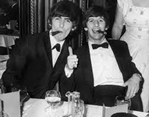
While John Lennon and Paul McCartney were in their own little world being one of the greatest songwriting partners in music, George Harrison and Ringo Starr were forging a perfect partnership of their own.
George helped Ringo with classic Beatles songs like “Octopus’s Garden.” Despite the strange time signature of “Here Comes the Sun,” Ringo knew how to enter the song perfectly. The Beatles’ split did not affect their working relationship whatsoever. They continued collaborating as if nothing had happened.
Whenever George asked Ringo to play on one of his songs, he knew the drummer would do his best.
Source: Hannah Wigandt/cheatsheet.com
details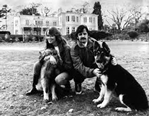
Ringo Starr grew up in a poor section of Liverpool and became an international star because of his drumming talent. Artistic honors and musical halls of fame inductions followed for The Beatles’ timekeeper. Ringo made the most obvious statement when he said his life was like a fairy tale. Yet recording at Ringo’s house was hardly a dream come true for visiting musicians.
Barbara Bach (left), Ringo Starr, and their dogs pose on the lawn outside their house in 1981.
Ringo’s London apartment was like a playground for his friends. Paul McCartney recorded music there. Jimi Hendrix rented it. John Lennon and Yoko Ono shot the cover art for Two Virgins there.
The Beatles’ drummer eventually moved out and became neighbors with John. Later, Ringo bought John’s house — named Tittenhurst Park — (and burned all his leftover possessions) after the Fab Four finally fractured, but he rarely stayed there. The timekeeper lived in Monaco, crashed with John in Los Angeles, and jetted around the globe in the 1970s.
When Ringo and his wife, Barbara Bach, decided to settle down at Tittenhurst, it made using the estate’s home studio torture for visiting bands.
Source details
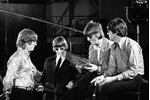
On a warm day in September 2022, alongside 40 or so press colleagues, I was treated to an advance demonstration of the Dolby Atmos mix of The Beatles' Revolver, at Republic Studios on Broadway In New York City's midtown. Producer/mixer Giles Martin—son of original Beatles producer Sir George Martin—was our host. Giles Martin's demeanor was self-deprecating, and he seemed to know all there is to know about the Beatles and their productions. As Martin played songs from Revolver in surround sound, the assembled group seemed amazed by what they heard.
Played through a JBL-based 7.1.4 system in a conference room (footnote 1), "Tomorrow Never Knows," Revolver's final track (which, however, was the first to be recorded), was transformed. Based on texts from The Psychedelic Experience: A Manual Based on the Tibetan Book of the Dead and employing radical elements including musique concrète, avant-garde composition, and tape loops, the effect of this new, spacious soundfield—on an album known for its claustrophobic production—was shocking. At the front of the mix, Lennon's vocal was large; it came across with more texture and nuance than I'd ever heard.
Source: Ken Micallef/stereophile.com details

The earliest known full recording of The Beatles playing a live show in the UK has been found almost exactly 60 years after it was made.
As BBC News reports, the hour-long quarter-inch tape recording was created by John Bloomfield at Stowe boarding school in Buckinghamshire on April 4, 1963 when the Fab Four performed there.
Bloomfield, who is now 75 years old, was only 15 at the time. He revealed the existence of the tape when journalist Samira Ahmed visited Stowe to make a special programme for Radio 4’s Front Row to mark the gig’s 60th anniversary.
“It was a unique Beatles gig, performed in front of an almost entirely male audience,” Ahmed wrote of the discovery. “And crucially, despite loud cheers and some screaming, the tape is not drowned out by the audience reaction.”
Source: Tom Skinner/nme.com
details
After The Beatles broke up, John Lennon wrote many songs that were not subtle with their politics. Some went too far in certain people’s eyes and were banned from playing on the radio. Not every political Lennon song received a ban, but here are three songs that were. “Cold Turkey” was released in 1969 and is one of the earliest songs from John Lennon’s solo career. Lennon wrote the track after he and his wife, Yoko Ono, went cold turkey after a brief heroin addiction. Many believed the song was promoting drugs, and it was subsequently banned on many American radios. In his 1980 interview with Playboy, Lennon said “Cold Turkey” never had the chance to become popular after it was banned.
“‘Cold Turkey’ is self-explanatory,” he said. “It was banned again all over the American radio, so it never got off the ground. They were thinking I was promoting heroin, but instead … They’re so stupid about drugs!”
Even with the ban, “Cold Turkey” was still a minor hit in the U.S., reaching No. 30 on the U.S. Billboard Hot 100. It also reached No. 14 on the U.K. Official Charts.
Source: Ross Tanenbaum/cheatsheet.com
< details
In his prime, Phil Spector produced timeless tracks and numerous chart-topping pieces… so even if his later years wouldn’t be as bright, since he would spend his last days in prison convicted for murder, Spector was the ‘it guy’ if you were looking for a brilliant producer to help you dominate the charts in the late 60s.
So, it wasn’t long before none other than the Beatles contacted him for a collaboration, and Phil, we might guess, readily accepted the offer. Well, when it comes to British rockers’ history with producers, perhaps, there’s no need to say how lucky they had while working with producer George Martin, whose brilliance led people often call him ‘the fifth Beatle.’
There were even times when the band left Martin to his own devices, giving him their blessings to produce some of their beloved tracks the way he thought would be the best. So, it might be only fair to say that the Fab Four never had any significant problems or trust issues while working with their producers.
The productions of ‘Let It Be,’ however, differed from the rest of their celebrated discography since it had been quite challenging for the band to focus on t details
